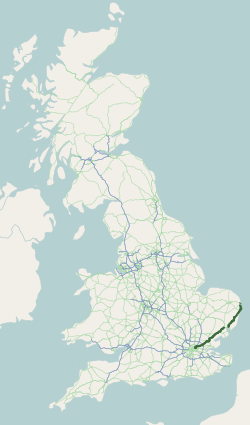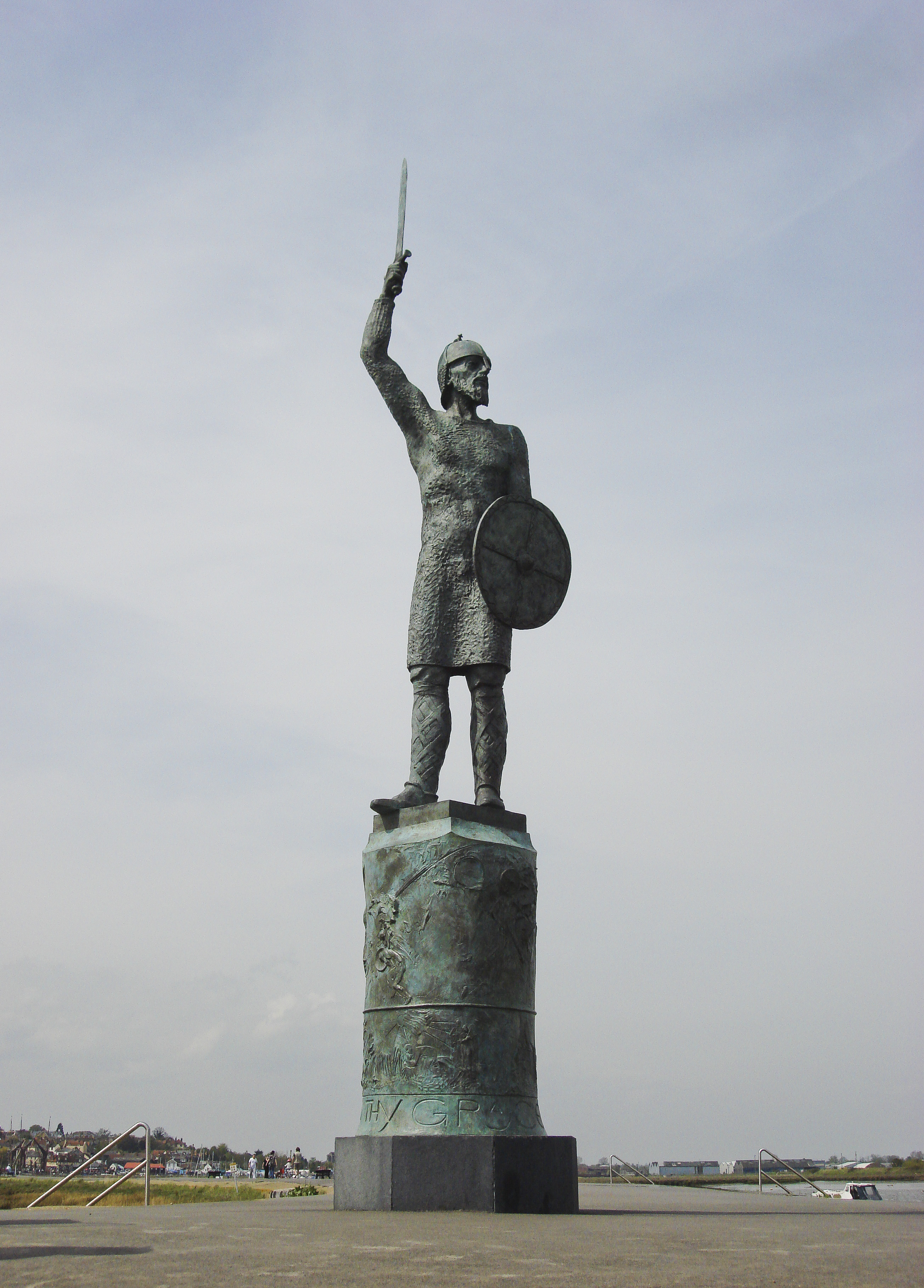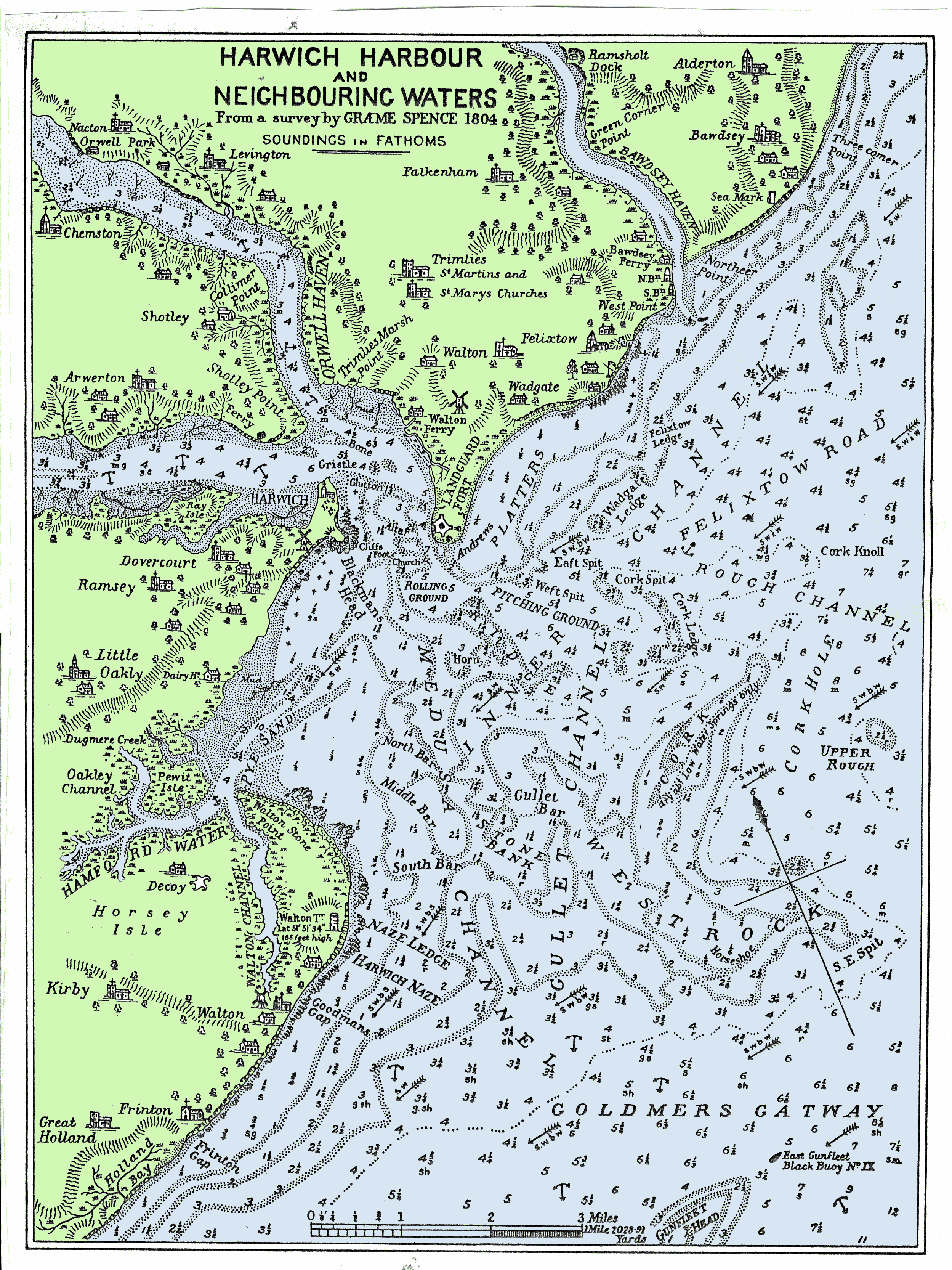|
A1232
Ipswich Road, formally the A1232, is a road in Colchester, Essex, England. It was the historic coaching route and main road to Ipswich from the Middle Ages onwards, and was part of the A12, a main road in East Anglia, until the A12 was rerouted in 1974. Rovers Tye Farm, a pub since 1983, was established by 1353, and a causeway at this location had been built by 1429, by which point Ipswich Road ran on its current route. The road once contained the County Gaol and County Police Station. The Grade II listed St. John's Church was built in 1864 by Arthur Blomfield in the High Victorian Early Gothic style. The toothpaste tube manufacturer Betts opened a factory at No. 505 Ipswich Road in 1953. More recently there have been the development of housing and industrial estates along the road, particularly automobile dealers, at the northern end where it meets the A12. Route The road runs northeast from East Street, crossing the Great Eastern Main Line, to Ardleigh Wick where it m ... [...More Info...] [...Related Items...] OR: [Wikipedia] [Google] [Baidu] |
A12 Road (England)
The A12 is a major road in Eastern England. It runs north-east/south-west between London and the coastal town of Lowestoft in the north-eastern corner of Suffolk, following a similar route to the Great Eastern Main Line until Ipswich. A section of the road between Lowestoft and Great Yarmouth became part of the A47 in 2017. Between the junctions with the M25 and the A14, the A12 forms part of the unsigned Euroroute E30 (prior to 1985, it was the E8). Unlike most A roads, this section of the A12, together with the A14 and the A55, has junction numbers as if it were a motorway. The section of the A12 through Essex has sections of dual two lanes and dual three lanes, with eight changes in width between the M25 to Ipswich. It was named as Britain's worst road because of "potholes and regular closures due to roadworks" in a 2007 survey by Cornhill Insurance. The A12 is covered by Highways England's A12 and A120 Route Management Strategy. Starting just north of the Blackwall Tu ... [...More Info...] [...Related Items...] OR: [Wikipedia] [Google] [Baidu] |
A120 Road (England)
The A120 is an A-road in England, which runs between Puckeridge in Hertfordshire and Harwich in Essex. Along its route, the A120 bypasses the towns of Bishop's Stortford, Great Dunmow, Braintree, Coggeshall, Colchester and Dovercourt. The route meets the A10, A131, A12 and A133 primary routes and the M11 motorway. London Stansted Airport sits directly north of the route on the Essex and Hertfordshire border. Harwich International Port, a North Sea seaport at the mouth of the River Stour, lies north of the A120 near Harwich. Part of the route constitutes Euroroute E32, between the A12 ( E30) at Colchester and Harwich International Port. Route Hertfordshire At its western terminus, the A120 meets the A10 at a roundabout south-west of Puckeridge. The A10 runs southbound towards Hertford and London, and northbound towards Royston and Cambridge. Carried by Standon Hill, the A120 passes along the southern perimeter of Puckeridge and into the village of Standon. The r ... [...More Info...] [...Related Items...] OR: [Wikipedia] [Google] [Baidu] |
Ipswich Road, Looking South - Geograph
Ipswich () is a port town and borough in Suffolk, England, of which it is the county town. The town is located in East Anglia about away from the mouth of the River Orwell and the North Sea. Ipswich is both on the Great Eastern Main Line railway and the A12 road; it is north-east of London, east-southeast of Cambridge and south of Norwich. Ipswich is surrounded by two Areas of Outstanding Natural Beauty (AONB): Suffolk Coast and Heaths and Dedham Vale. Ipswich's modern name is derived from the medieval name ''Gippeswic'', probably taken either from an Anglo-Saxon personal name or from an earlier name given to the Orwell Estuary (although possibly unrelated to the name of the River Gipping). It has also been known as ''Gyppewicus'' and ''Yppswyche''. The town has been continuously occupied since the Saxon period, and is contested to be one of the oldest towns in the United Kingdom.Hills, Catherine"England's Oldest Town" Retrieved 2 August 2015. Ipswich was a settlement of ... [...More Info...] [...Related Items...] OR: [Wikipedia] [Google] [Baidu] |
Byrhtnoth
Byrhtnoth ( ang, Byrhtnoð), Ealdorman of Essex ( 931 - 11 August 991), died at the Battle of Maldon. His name is composed of the Old English ''beorht'' (bright) and ''noþ'' (courage). He is the subject of ''The Battle of Maldon'', an Old English poem, J.R.R. Tolkien's short play in verse, '' The Homecoming of Beorhtnoth, Beorhthelm's Son'', and a modern statue at Maldon. Death in battle His death, while leading the Anglo-Saxon forces against the Vikings in 991, is the subject of the famous Old English poem ''The Battle of Maldon''. As presented there, his decision to allow the Vikings to move to a better position was heroic but fatal. He was said to stand well over six feet in height, and was around the age of sixty years at the Battle of Maldon, with "swan-white hair". Although it is believed that he fell early in the battle, some say that it took three men to kill him, one of them almost severing Byrhtnoth's arm in the process. He had previously had several military succe ... [...More Info...] [...Related Items...] OR: [Wikipedia] [Google] [Baidu] |
Ipswich Star
The ''Ipswich Star'' (formerly ''Evening Star'') is a daily evening local newspaper based in Ipswich, UK published by Archant. The newspaper started publication on 17 February 1885 and is published Monday to Friday. History The newspaper was known as The Star of the East from 1885 until 1893 when it became ''The Evening Star''. On 23 January 2012 ''The Evening Star'' was rebranded as the ''Ipswich Star'', for sale in Ipswich, and the ''Felixstowe Star'' for sale in Felixstowe. Both editions are published Monday to Friday only, with a Saturday edition no longer viable. The newspaper has long been published by the same company as the ''East Anglian Daily Times The ''East Anglian Daily Times'' is a British local newspaper for Suffolk and Essex, based in Ipswich. History The newspaper began publication on 13 October 1874, incorporating the ''Ipswich Express'', which had been published since 13 August ...''. The news operations were merged in 2010. In the period December 2010 ... [...More Info...] [...Related Items...] OR: [Wikipedia] [Google] [Baidu] |
Karlsruhe
Karlsruhe ( , , ; South Franconian: ''Kallsruh'') is the third-largest city of the German state (''Land'') of Baden-Württemberg after its capital of Stuttgart and Mannheim, and the 22nd-largest city in the nation, with 308,436 inhabitants. It is also a former capital of Baden, a historic region named after Hohenbaden Castle in the city of Baden-Baden. Located on the right bank of the Rhine near the French border, between the Mannheim/ Ludwigshafen conurbation to the north and Strasbourg/Kehl to the south, Karlsruhe is Germany's legal center, being home to the Federal Constitutional Court (''Bundesverfassungsgericht''), the Federal Court of Justice (''Bundesgerichtshof'') and the Public Prosecutor General of the Federal Court of Justice (''Generalbundesanwalt beim Bundesgerichtshof''). Karlsruhe was the capital of the Margraviate of Baden-Durlach (Durlach: 1565–1718; Karlsruhe: 1718–1771), the Margraviate of Baden (1771–1803), the Electorate of Baden (1803–1806), th ... [...More Info...] [...Related Items...] OR: [Wikipedia] [Google] [Baidu] |
Avro Lancaster
The Avro Lancaster is a British Second World War heavy bomber. It was designed and manufactured by Avro as a contemporary of the Handley Page Halifax, both bombers having been developed to the same specification, as well as the Short Stirling, all three aircraft being four-engined heavy bombers adopted by the Royal Air Force (RAF) during the same wartime era. The Lancaster has its origins in the twin-engine Avro Manchester which had been developed during the late 1930s in response to the Air Ministry Specification P.13/36 for a medium bomber for "world-wide use" which could carry a torpedo internally, and make shallow dive-bombing attacks. Originally developed as an evolution of the Manchester (which had proved troublesome in service and was retired in 1942), the Lancaster was designed by Roy Chadwick and powered by four Rolls-Royce Merlins and in one of the versions, Bristol Hercules engines. It first saw service with RAF Bomber Command in 1942 and as the strategic bom ... [...More Info...] [...Related Items...] OR: [Wikipedia] [Google] [Baidu] |
Harwich Road, Colchester
Harwich is a town in Essex, England, and one of the Haven ports on the North Sea coast. It is in the Tendring District, Tendring district. Nearby places include Felixstowe to the north-east, Ipswich to the north-west, Colchester to the south-west and Clacton-on-Sea to the south. It is the northernmost coastal town in Essex. Its position on the estuaries of the River Stour, Suffolk, Stour and River Orwell, Orwell rivers, with its usefulness to mariners as the only safe anchorage between the River Thames, Thames and the Humber, led to a long period of civil and military maritime significance. The town became a naval base in 1657 and was heavily fortified, with Harwich Redoubt, Beacon Hill Battery, and Bath Side Battery. Harwich is the likely launch point of the ''Mayflower'', which carried English Puritans to North America, and is the presumed birthplace of ''Mayflower'' captain Christopher Jones (Mayflower captain), Christopher Jones. Harwich today is contiguous with Dovercour ... [...More Info...] [...Related Items...] OR: [Wikipedia] [Google] [Baidu] |
Great Depression
The Great Depression (19291939) was an economic shock that impacted most countries across the world. It was a period of economic depression that became evident after a major fall in stock prices in the United States. The economic contagion began around September and led to the Wall Street stock market crash of October 24 (Black Thursday). It was the longest, deepest, and most widespread depression of the 20th century. Between 1929 and 1932, worldwide gross domestic product (GDP) fell by an estimated 15%. By comparison, worldwide GDP fell by less than 1% from 2008 to 2009 during the Great Recession. Some economies started to recover by the mid-1930s. However, in many countries, the negative effects of the Great Depression lasted until the beginning of World War II. Devastating effects were seen in both rich and poor countries with falling personal income, prices, tax revenues, and profits. International trade fell by more than 50%, unemployment in the U.S. rose to 23% and ... [...More Info...] [...Related Items...] OR: [Wikipedia] [Google] [Baidu] |
Looking West Down The Mainline - Geograph
Looking is the act of intentionally focusing visual perception on someone or something, for the purpose of obtaining information, and possibly to convey interest or another sentiment. A large number of troponyms exist to describe variations of looking at things, with prominent examples including the verbs "stare, gaze, gape, gawp, gawk, goggle, glare, glimpse, glance, peek, peep, peer, squint, leer, gloat, and ogle".Anne Poch Higueras and Isabel Verdaguer Clavera, "The rise of new meanings: A historical journey through English ways of ''looking at''", in Javier E. Díaz Vera, ed., ''A Changing World of Words: Studies in English Historical Lexicography, Lexicology and Semantics'', Volume 141 (2002), p. 563-572. Additional terms with nuanced meanings include viewing, Madeline Harrison Caviness, ''Visualizing Women in the Middle Ages: Sight, Spectacle, and Scopic Economy'' (2001), p. 18. watching,John Mowitt, ''Sounds: The Ambient Humanities'' (2015), p. 3. eyeing,Charles John Smi ... [...More Info...] [...Related Items...] OR: [Wikipedia] [Google] [Baidu] |
Colchester Castle
Colchester Castle is a Norman castle in Colchester, Essex, England, dating from the second half of the eleventh century. The keep of the castle is mostly intact and is the largest example of its kind anywhere in Europe, due to its being built on the foundations of the Roman Temple of Claudius, Colchester. The castle endured a three-month siege in 1216, but had fallen into disrepair by the seventeenth century when the curtain walls and some of the keep's upper parts were demolished; its original height is debated. The remaining structure was used as a prison and was partially restored as a large garden pavilion, but was purchased by Colchester Borough Council in 1922. The castle has since 1860 housed Colchester Museum, which has an important collection of Roman exhibits. It is a scheduled monument and a Grade I listed building. Construction The attribution of the castle as a royal foundation is based on a charter of Henry I dated 1101, granting the town and castle of Colches ... [...More Info...] [...Related Items...] OR: [Wikipedia] [Google] [Baidu] |
English Civil War
The English Civil War (1642–1651) was a series of civil wars and political machinations between Parliamentarians (" Roundheads") and Royalists led by Charles I ("Cavaliers"), mainly over the manner of England's governance and issues of religious freedom. It was part of the wider Wars of the Three Kingdoms. The first (1642–1646) and second (1648–1649) wars pitted the supporters of King Charles I against the supporters of the Long Parliament, while the third (1649–1651) saw fighting between supporters of King Charles II and supporters of the Rump Parliament. The wars also involved the Scottish Covenanters and Irish Confederates. The war ended with Parliamentarian victory at the Battle of Worcester on 3 September 1651. Unlike other civil wars in England, which were mainly fought over who should rule, these conflicts were also concerned with how the three Kingdoms of England, Scotland and Ireland should be governed. The outcome was threefold: the trial of and ... [...More Info...] [...Related Items...] OR: [Wikipedia] [Google] [Baidu] |











